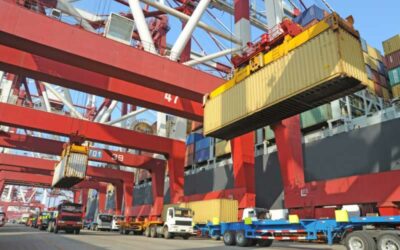Top 5 Factors Affecting Container Shipping Rates
Container Shipping Ocean freight is known to be the key to maintaining the modern economy, making up a massive 90% of international trade. The biggest contributors to this enormous industry are the thousands and millions of companies that are importing and exporting merchandise to and fro the different corners of the world. As shipping is closely associated with the economy, even the smallest of changes tend to have rather overwhelming impacts in demand, supply, and international trade, in general.

Container shipping rates depend on a wide variety of factors which is inclusive of route, volume and carrier charges. However, there are other external factors which affect the container shipping rates that are not under the control of the shippers themselves. Let us take a look at 5 of these factors that contribute to fluctuating container shipping rates:
1. GRI
General Rate Increase, also known as GRI for short, is referred to the changes made to the ocean freight prices by the container shipping lines themselves. GRI is usually performed to help the various carriers recover from the low market movement which is the part of the seasonal cycle. If the year is relatively stable, then GRI is applied only once. However, there have been instances when GRI has been applied several times in the same year.
GRI can be added to any ocean freight rate. However, in recent years, GRI has mostly been applied to imports more than exports, especially the ones from the Far East. The carriers have the full authority over which routes the GRI will affect and by how much. According to the Federal Maritime Commission regulations in the States, the shipping lines must inform about the rate increases 30 days before it goes into effect. However, this rule only applies to ocean freight rates in the US, in other countries; it might be as less as a week. This could mean that if, for instance, your booking has not been locked in the day before GRI went into effect, you might have to pay almost double the original price.
2. Shipping During High Seasons
As in every other industry, even the shipping industry has its high seasons. This is the time when the demand for ocean freight increases dramatically which affects various factors including the global supply chain, the vessel capacities, and even freight prices. The high season is usually from July until November or even December as much of the companies prepares their merchandise for the upcoming holiday season. This increase in demand causes container shipping lines to raise the freight rates usually at the beginning of the high season. In some cases, an additional surcharge may also be applied to fit in the extra logistics work that is needed during the peak season.

As China is known to be the World’s second largest exporter, during certain times of the year such as the Chinese New Year which falls in January/February and the National Day Golden Week which falls in the first week of October, much of the production, as well as sales, work come to a halt. This leads to massive impacts in the global supply chain every year during these times.
Thus, prior to these holidays, there is a sudden increase in shipping of merchandise. This leads to an increase in freight prices during this time. As logistical congestion is significant during these seasons, it might even be a task to get a container.
3. Additional Ocean Freight Costs
There is no way one can anticipate certain freight costs including demurrage, detention and even fees from custom inspections. These fees are usually not included as part of the container shipping rates, yet they massively impact the complete shipping cost.
Although these costs are usually beyond the scope of the shipper, the shipper needs to take all the precautionary measures to avoid running into them. This could be by getting all the documentation right from A-Z. Even the tiniest of inconsistencies may raise suspicions and cause customs to check the shipment. Checking of the shipment may happen at either the origin or at the destination. Keeping all these points in mind can reduce the chances of your shipment getting detained and thus running into delay fees.
Advance planning of your shipment can greatly help you reduce the chances of making errors that can cost you later. You will have enough time to get everything done on time and prepare your merchandise early on. You might also sort out other issues such as not having to ship during the high season or even truck shortage issues.
4. Emergency Bunker Surcharge (EBS)
Shipping lines can implement various surcharges whenever they believe it is necessary to do so. Emergency Bunker Surcharge (EBS) is one such charge which addresses the increase in fuel costs. Bunker Adjustment Factor (BAF) is another surcharge that covers the varying costs of fuel costs because of the natural movements in the market. However, the BAF charges are known in advance. The EBS however is implemented as an emergency charge thus one only finds out the last minute. This leads to sudden changes in the final shipping costs.
The Emergency Bunker Surcharges are also applied when the carriers anticipate rising fuel costs. Much of the time the shippers have no control over this thus they claim this to be an unfair practice. Many people claim that the EBS is charged to cover up the operating losses’ of shipping lines under aspect of rising fuel costs.
5. Shortage In Trucking
The shortage of trucker is an extremely common logistical issue for much of the shippers. This however, is again, beyond their control. In the States, the issue of shortage of trucks has gone up since the application of the ELD since last December. This caused the availability of trucks to go scarce thus sometimes causing supply chains to go almost at a standstill.

When trucking shortages happen, the ocean freight prices increase dramatically. Rates also tend to increase as the capacity decreases and the demand increases. Much of the times, you might end up having to pay a hefty amount as a shipper in order to secure a spot to get a trucker. Planning your shipment in advance, causing your cargo to take an alternative route and having a backup plan can help you avoid facing shortages of trucks.






